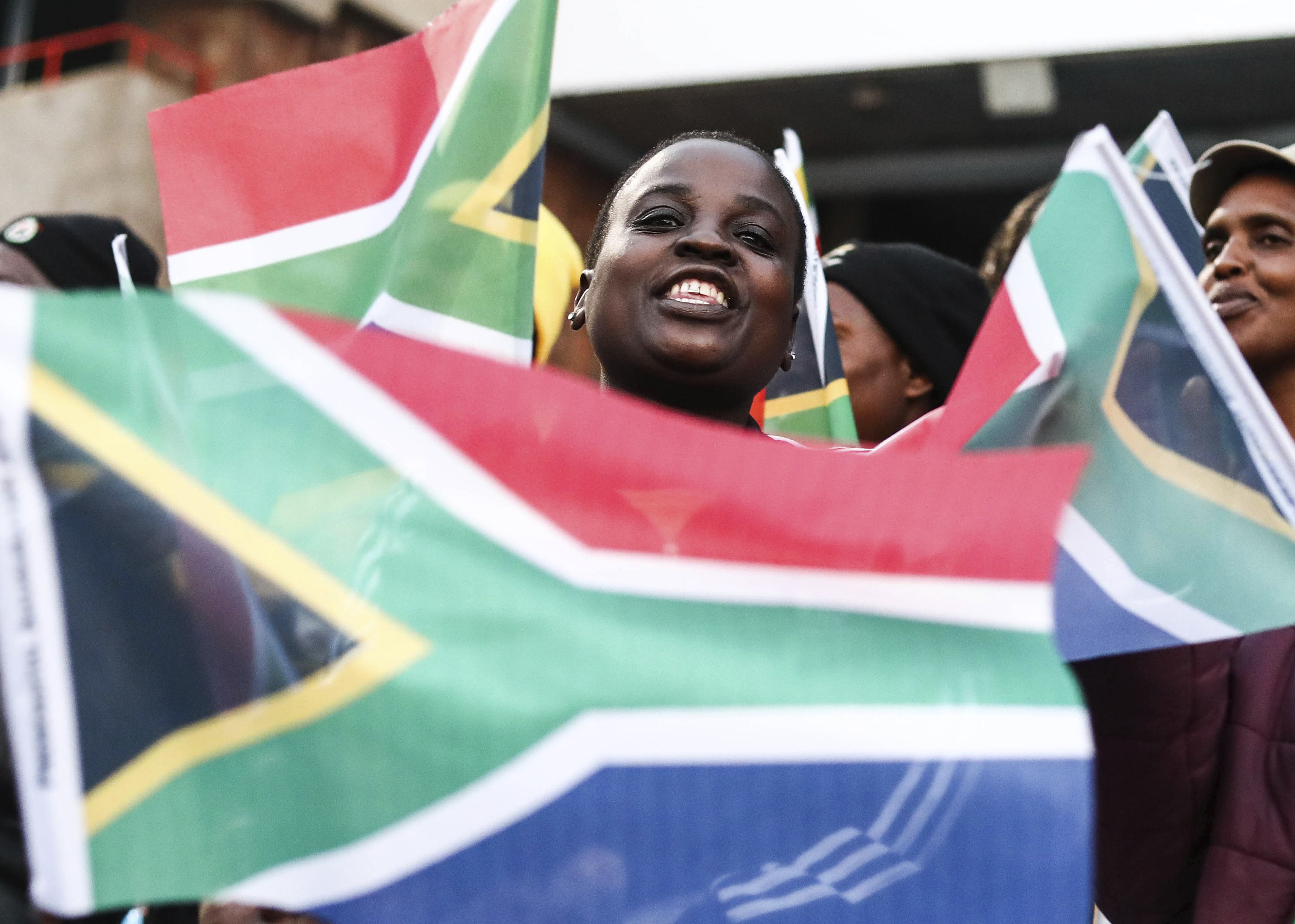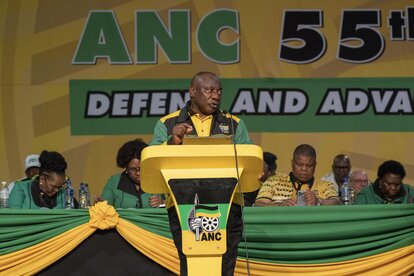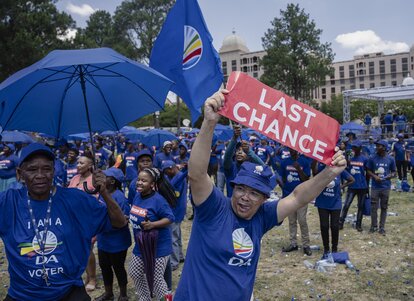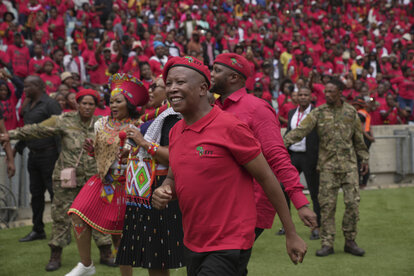South African elections
In search of a political match

Am 29. Mai wählt Südafrika ein neues Parlament.
© picture alliance/AP Photo | UncreditedSouth Africa goes to the polls on May 29, 2024, as part of the upcoming parliamentary/National and provincial elections. After 30 years of government by Nelson Mandela's party, the African National Congress (ANC), and at the same time, 30 years after the first democratic elections, the party landscape appears more diverse and dynamic. The result of the polls is more uncertain than ever before.
The changing political terrain
After South Africa emerged from the shadow of apartheid with the historic elections of 1994, which marked the end of minority rule and the beginning of a new era, it embarked on a path towards inclusion and equality with Nelson Mandela at the helm of government, in line with his vision of a "rainbow nation". As liberators from apartheid, the ANC has always held a significant electoral position and shaped the political landscape of South Africa for over three decades.
However, the political terrain is shifting, with essential issues looming on the horizon that are challenging the fabric of South African society: Economic inequality, the legacy of land ownership, disastrous state healthcare, growing crime, a persistent energy crisis and high (youth) unemployment remain vital issues in the national discourse and continue to shape the priorities of voters and politicians alike.
While the ruling ANC is trying to recall the common overcoming of apartheid and appeal to the at the electorate's former loyalty to regain trust; the opposition leader, the Democratic Alliance (DA), which also governs with an absolute majority in the Western Cape, is advocating an agenda to "save South Africa." This agenda aims at rapid restructuring within 100 days of an election victory.
Smaller parties are also vying for the attention of the electorate. Build One South Africa (BOSA), Rise Mzansi and Action SA, which are led by former DA or ANC politicians, are targeting a burgeoning black middle class, while the radical left-wing Economic Freedom Fighters (EFF) are propagating nationalisation and land expropriation. The Inkatha Freedom Party (IFP), which is particularly popular with the Zulu community, is vying with the ANC for supremacy in the province of KwaZulu-Natal.
The key players at a glance
The ANC: For three decades, the ANC was the face of the South African government and steered the country through the consequences of apartheid. Despite its historical significance, the ANC is now being scrutinised by voters for its handling of issues such as unemployment, corruption, and infrastructure decay. In its election campaign, the ANC is reflecting on its roots as a freedom movement and will continue to be led by President Ramaphosa in 2022 despite direct allegations of corruption.

Der südafrikanische Präsident Cyril Ramaphosa spricht vor der nationalen Konferenz des African National Congress in Johannesburg, Südafrika.
© picture alliance / ASSOCIATED PRESS | Jerome DelayThe DA: As the largest opposition party, the DA bases its claim to governance on its already successful provincial government and municipal leadership in the Western Cape and Cape Town and is committed to an agenda of economic liberalism and government efficiency. However, the party has struggled with internal fractures. It is often perceived as catering primarily to the white population, led by John Steenhuisen, with the influential Helen Zille in the background.

Anhänger der Oppositionspartei Democratic Alliance (DA) demonstrieren im Rahmen der Veranstaltungen zu den Parlamentswahlen im Mai in Pretoria, Südafrika .
© picture alliance / Anadolu | Ihsaan HaffejeeThe EFF: Under the leadership of Julius Malema, the EFF advocates radical left-wing policies, including land expropriation without compensation, the nationalization of key industries and the doubling of social benefits. The EFF positions itself as an alternative to the mainstream political establishment and thus attracts young disillusioned South Africans and former ANC supporters in particular. The EFF has also extended its influence on young students who perceive current policies as exploitative and unjust.

Führer der Economic Freedom Fighters Julius Malema.
© picture alliance / ASSOCIATED PRESS | Tsvangirayi MukwazhiMK: Founded by former President Jacob Zuma and seeks to mobilize Zuma loyalists and left-wing factions within the ANC. With its promises of radical change and populist rhetoric, MK poses a potential threat to the ANC's electoral strongholds in the provinces of KwaZulu-Natal and Mpumalanga.
ActionSA: A spin-off of the DA led by former mayor Herman Mashaba focuses on liberal economic policies and the narrative of self-made success and appeals to a broad spectrum of voters disillusioned with the traditional parties. With their statements on crime and immigration, they are slightly to the right.
BOSA: Another DA offshoot, led by Mmusi Maimane, targets young professionals and middle-class voters disillusioned with the ANC and the DA.
IFP: With a strong base in KwaZulu-Natal, the IFP presents itself as a moral alternative to the ANC, advocating integrity-based governance and aligning itself with Western foreign policy positions.
Rise Mzansi: A newcomer to the political scene under the leadership of Songezo Zibi, represents classic social democratic values and focuses on leadership, security, the economy, well-being and climate protection. In addition, her agenda includes pro-women programs.
For more information, see also: Daily Maverick’s election 2024 coverage is supported, in part, by the Friedrich Naumann Foundation for Freedom
The right match
Many South Africans are faced with the critical question of which party best represents their values and beliefs when they vote in these landmark elections.
By analysing the statements outlined in the manifestos, proclaimed at campaign rallies, and made at numerous pre-election dialogue events organised by civil society on the critical issues of the economy, healthcare, education and social values, you can find out which party comes close to your political ideal. However, it is essential to remember that no party is likely to be 100% in line with your values and norms:
Economics
Which economic approach appeals to you the most?
a) Prioritising private sector growth and deregulation (DA, BOSA)
b) Advocating nationalisation and wealth redistribution (ANC, EFF)
c) Promoting small business development and entrepreneurship (ActionSA, Rise Mzansi)
Health care
What should the health system focus on?
a) Focus on public health care and access for all (ANC, EFF, RISE)
b) Support private sector participation and competition (DA, BOSA)
c) Advocate a hybrid system with public and private options (ActionSA, IFP)
Education
Which education policy best reflects your ideals?
a) Investment in public education and equal access for all (ANC, EFF)
b) Support free school choice and competition (DA, BOSA)
c) Emphasize skills development and vocational training (ActionSA, Rise Mzansi)
Social values
Which approach to social justice and values appeals to you?
a) Focus on redress for historical injustices and inequalities (ANC, EFF)
b) Emphasis on meritocracy and equality of opportunity (DA, BOSA)
c) Advocacy of community empowerment and social welfare (IFP, RISE)

